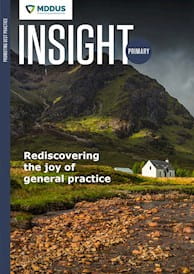These cases are based on actual calls made to MDDUS advisers and are published here to highlight common challenges within general practice. Details have been changed to maintain confidentiality.
HCAs vaccinating children
Q. Our practice has two healthcare assistants (HCAs). Are they allowed to undertake immunisation of babies and young children under the supervision of our practice nurse?
Healthcare assistants are not registered with a professional body but are accountable to the practice to follow a contract of employment. The practice in turn has a responsibility to ensure that HCAs are trained and supervised properly. Supervising clinicians will have vicarious liability and accountability for the actions and omissions of the HCA, so it is therefore important to ensure they work within the limits of their competence.
The healthcare professional supervising an HCA has responsibility for the safe delegation of tasks, as set out in the Nursing and Midwifery Council (NMC) The Code and the General Medical Council (GMC) Good medical practice guidance. Both professional bodies advise that when you delegate the care of a patient to a colleague you must be satisfied that the person has the appropriate qualifications, skills and experience.
No specific restrictions are in place regarding HCAs treating children. Each case should be considered independently but the principles of delegation remain the same. The HCA should have been trained and assessed as competent, and their job description should be specific to their role. Many HCAs will carry out care for patients independently but they should have access to a registered nurse or GP who can provide advice and support when necessary. The level of supervision required will depend on the task being undertaken, and the assessment of each patient for the immunisation must be made by an appropriate clinician. A patient specific directive (PSD) would need to be in place for these patients.
Responding to negative online reviews
Q. A small number of patients have left negative (and in our view unfair) reviews on the practice's Facebook page in regard to care received at our surgery. How should we respond?
It’s natural to feel upset or defensive about negative online feedback. The knee-jerk reaction may be to reply immediately to the post to set the record straight but it is best to take time and reflect. Responding directly online to the review could result in a breach your patient's confidentiality. Our advice in these circumstances is to limit any response to a simple acknowledgement of the concern and to provide a link to your practice complaints policy. You should not go into any specific detail about the patient making the comment.
If you are able to identify specific patients and are certain they have posted the comments, you could consider making direct contact with the patient (not on social media). This could be in the form of a letter or email expressing regret for the discontent noted online and inviting the patient to raise their concerns directly via the complaints procedure.
GP leads or practice managers are advised to establish and regularly review policies on social media use and include staff guidance on how to deal with online feedback. Read more in our advice article Responding to online practice criticism.
Lasting power of attorney
Q. A patient at our practice has dementia and may lack capacity. Her son claims to have power of attorney and is asking for access to her medical records. How should we handle this request?
The first thing is to establish whether the patient has capacity to make this decision. This should be assessed and if she is deemed to have capacity the practice would then require her consent to disclose personal information to her son. If the patient does not have capacity, decisions regarding disclosure must be of overall benefit to the patient, and you must have no reason to believe the patient would have objected to sharing information with her son. See GMC guidance on Confidentiality for further guidance.
Although relevant legal frameworks differ across the UK, there are common themes. In all jurisdictions there is the option for a patient, before capacity is lost, to appoint a legally recognised medical proxy decision-maker to make medical decisions at such time as they may lose capacity. A power of attorney appointed in relation to health and welfare would be entitled access to relevant clinical information about the patient. Other disclosures (including requests from financial and property attorneys) should only be granted if it is of overall benefit to the patient.
In this case it would be necessary first to ask the son for proof of lasting power of attorney (health and welfare) in the form of registered paperwork (and this should be recorded in the notes), and to understand more about the purpose for which the information is required. It is unlikely to be appropriate to provide full access to the patient’s medical records and any disclosure made should be proportionate and relevant to its purpose.
Nursing registration lapsed
Q. Our practice nurse returned today from a two-week holiday and at lunch time discovered that she had neglected to pay her annual renewal fee with the Nursing and Midwifery Council and her registration has lapsed. She consulted with three patients in her morning asthma clinic before discovering the oversight. The nurse has contacted the NMC to reinstate her registration. What should the practice do regarding the patients?
Health professionals are required to be open and honest with patients when something goes wrong with their treatment or care (see GMC guidance on The professional duty of candour). We would advise writing to the three patients involved explaining the circumstances of the oversight by your nurse and offering reassurance in regard to her skills and competence. The letter should offer an apology and invite the patients to contact the practice with any specific concerns. It could also include steps the practice will take to ensure such an oversight does not happen again. This may involve a new practice policy requiring all registered members of the healthcare team to produce regular evidence of their registration with the relevant regulatory body and a diary system seeking renewed certificates at the end of the relevant period of registration.
Digital patient photographs
Q. Our practice has seen a large increase in the number of photographs taken by patients and emailed to us prior to telephone consultations. Some of the photographs are of intimate areas and we wanted to ask for clarification on whether these should be stored in digital records?
The GMC provides advice in Making and using visual and audio recordings of patients. The guidance makes it clear that any photographs used as part of patient care should be stored securely in the medical records. Patients should be informed of this and provide their consent prior to the photograph being sent to the practice.
The same advice would apply to intimate images and it is again important that the patient (or parents/carer) understands prior to sending the image that it will form part of the medical record. It would also be helpful to highlight to patients that there are risks in sending photographs via an insecure email account. Photographs uploaded into the patient’s medical records should be immediately deleted from the email system originally sent to. It may also be worthwhile updating the practice’s privacy notice to reflect how such photographs will be processed.
This page was correct at the time of publication. Any guidance is intended as general guidance for members only. If you are a member and need specific advice relating to your own circumstances, please contact one of our advisers.
Read more from this issue of Insight Primary

Save this article
Save this article to a list of favourite articles which members can access in their account.
Save to library

